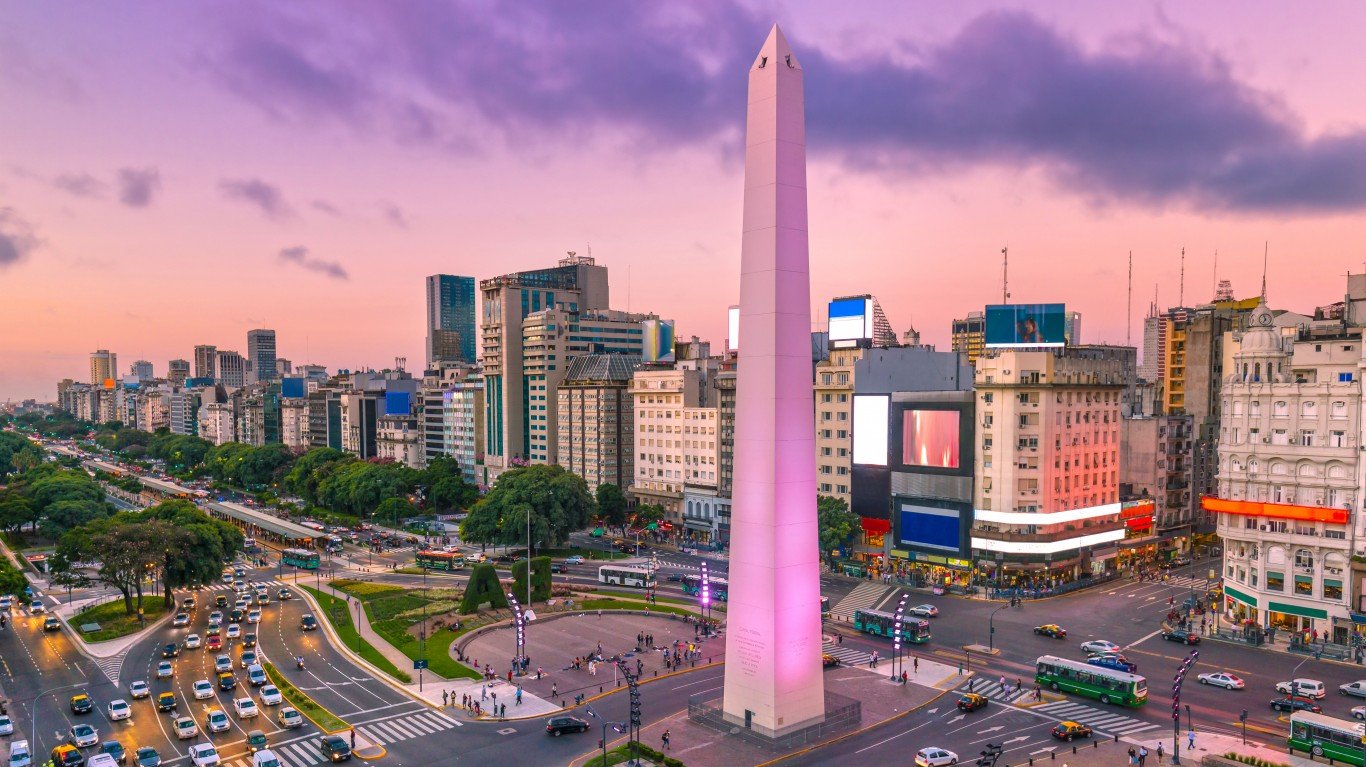

Some countries just never seem to be able to get it right. The United States, China, the nations in Europe, Japan and elsewhere all have problems of their own. Even for the historic volatility of South America, Argentina is setting perhaps the worst example that some people have ever seen. The reaction to Argentinian President Mauricio Macri losing a primary election by a wider than expected margin has lowered his chances of being re-elected in October. The reaction in Argentina’s top stocks was worse than atrocious. It was a bloodbath.
The loss is touted as a victory for Argentina’s populist Peronist movement, which aims for greater national control of the economy and opposes a European Union trade agreement.
Argentina’s currency, the peso, was down 15% and bonds felt the heat, but many of Argentina’s top stocks were effectively cut in half. The U.S.-listed exchange-traded funds and the U.S.-listed American depositary shares (ADSs) all took it on the chin on Monday.
24/7 Wall St. captured the carnage of Monday’s share price drops, and many investors will be wondering if Argentina is at risk of becoming the next nation to implode financially. While Macri may try to implement economic stimulus, the volatility after Monday’s drop could now last for weeks or even months.
Argentina is a nation of 44 million people, and its gross domestic product was roughly $518 billion in 2018. That is down from about $643 billion in 2017 and was the worst GDP reading going back to 2010.
The S&P Merval Index was down 37.9% at 25,530.80 on Monday, but the Global X MSCI Argentina ETF (NYSE: ARGT) was down 24.4% at $25.21, and it has a 52-week range of $21.75 to $33.95. The iShares MSCI Argentina and Global Exposure ETF (NYSEARCA: AGT) closed down 24.1% at $21.60 on Monday, with a 52-week range of $18.34 to $29.00.
Where things were even worse was in some of the banking and other shares that trade as ADSs in New York.
Banco Macro S.A. (NYSE: BMA) closed down about 53% at $36.20, in a 52-week range of $31.00 to $77.31.
Compania Cervecerias Unidas S.A. (NYSE: CCU) closed down nearly 8% at $24.72, in a 52-week range of $24.30 to $29.48.
Grupo Financierco Galicia S.A. (NASDAQ: GGAL) closed down 56% at $16.75, in a 52-week range of $15.17 to $39.22.
Loma Negra Compania Industrial Argentina Sociedad Anonima (NYSE: LOMA) closed down 56% at $5.65, and it has traded in a 52-week range of $4.15 to $13.44.
Telecom Argentina S.A. (NYSE: TEO) closed down over 33% at $10.46, in a 52-week range of $10.10 to $19.88.
YPF Sociedad Anonima (NYSE: YPF) closed down 34% at $11.00, in a 52-week range of $10.26 to $18.73.
MercadoLibre Inc. (NASDAQ: MELI) is based in Argentina, but it is really operating all over Latin America as the local “amazon of Latin America.” MercadoLibre closed down 9.6% at $623.65, in a 52-week range of $257.52 to $698.98.
The iShares Latin America 40 ETF (NYSEARCA: ILF) closed down 3.1% at $31.16, and it has a 52-week range of $28.66 to $35.66. While this would have Latin America exposure 100% of the way and some Argentina exposure indirectly, none of its top holdings are actually Argentinian companies.
To put in context for U.S. terms just how sharp this cut was in Argentina, imagine waking up one day and seeing the Dow Jones industrial average down about 10,000 to 15,000 points.
Essential Tips for Investing: Sponsored
A financial advisor can help you understand the advantages and disadvantages of investment properties. Finding a qualified financial advisor doesn’t have to be hard. SmartAsset’s free tool matches you with up to three financial advisors who serve your area, and you can interview your advisor matches at no cost to decide which one is right for you. If you’re ready to find an advisor who can help you achieve your financial goals, get started now.
Investing in real estate can diversify your portfolio. But expanding your horizons may add additional costs. If you’re an investor looking to minimize expenses, consider checking out online brokerages. They often offer low investment fees, helping you maximize your profit.
Thank you for reading! Have some feedback for us?
Contact the 24/7 Wall St. editorial team.



